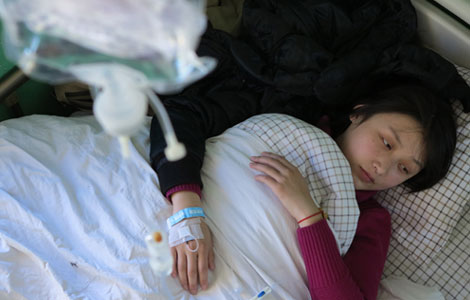Tougher penalties required against illegal food additives
|
 A woman being treated at a hospital in Fuyang, Anhui province, on Sunday. Twenty-three people developed symptoms of nitrite poisoning after eating at a fast food restaurant on Saturday. The restaurant was closed after the incident. Jing Wen / for China Daily |
Tough penalties will be used to end entrenched abuses in the catering industry, such as the use of poppy capsules, a major source of many opiates, and industrial coloring agents, according to the top food administrator.
The State Food and Drug Administration will urge in its 2012 food regulation plan a crackdown on the illegal use of additives.
Hotpot broth, beverages and seasonings will be key targets, as they are "danger zones" for food safety incidents triggered by additives.
Yi Junli, a food inspector in Yichang, Hubei province, who reports directly to the city's market regulator, said she will make daily visits to the 35 restaurants in her area this year, checking food labels and the use of additives.
Although some restaurant chains vouched for their food quality and said they have food safety specialists at every outlet, some hotpot stores still use poppy capsules, which can even lead to addiction, insiders said.
"It's easy to obtain poppy capsules from familiar sources," said Fan Shengwu, deputy secretary-general of the Henan Provincial Restaurants Association. "Campaigns are only temporary remedies, and lawbreaking will resume."
The city of Leshan, Sichuan province, launched a campaign in 2008 to crack down on the use of poppy capsules after city authorities found 12 out of 401 restaurants used the substance in hotpots.
The SFDA in March 2009 carried out special inspections to root out this practice.
Fan suggested that law enforcement agencies involve industry associations in long-term management, because they know the actual situation better than inspectors, who can be fooled if restaurants hide supplies of illegal additives.
"An association can unite its member restaurants to make a commitment and wipe out stubborn bad practices together" and expose restaurants breaking the law, he said.
Technology and cash - higher rewards for whistleblowers - are good ways to punish lawbreakers, according to some food safety experts.
"Electronic monitors in restaurant kitchens can provide a panoramic view of the action," said Qiu Baochang, head of the lawyers' group of the China Consumers' Association.
Local governments and officials should also take responsibility for food safety, Qiu said.
"The governor should be dismissed from office upon the occurrence of any food scandal and not get another post for the rest of their life. It's like those who have a record of drunk driving being barred from driving forever," he added.
Contact the writer at zhouwenting@chinadaily.com.cn


















